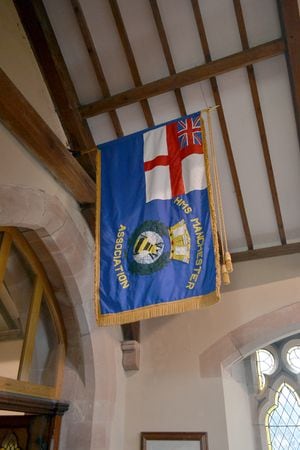How a revered WW2 captain who saved his crew ended up facing court martial
The ship was lost, but the crew was spared, and before she went down they gave three cheers for their revered Shropshire captain.
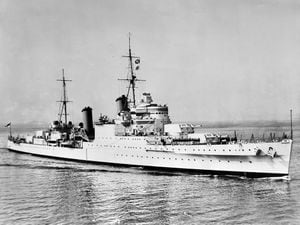
It was not a sentiment shared by the Admiralty. After the loss of the mighty warship HMS Manchester, Captain Harold Peter Drew of Oswestry was court martialled and condemned, and would never again be allowed command of a Royal Navy ship.
The decisions Captain Drew made on that fateful night in August 1942 possibly – perhaps probably – saved hundreds of lives.
As the cruiser lay listing and dead in the water, stricken by a torpedo and a sitting duck to enemy forces when dawn broke, he gave the order to abandon ship and scuttle her – that is, deliberately sink her.
His dilemma was neatly summed up in his words to his engineering commander as he mulled over his ship's dire predicament: "I have to make a decision whether to try and save this valuable ship, against the risk of further heavy loss of valuable lives."
But what he did was not in accord with the Royal Navy's Nelsonian traditions.
"As long as a ship remains afloat and has even one gun in action she may cause damage to the enemy," was the view of the First Sea Lord, Sir Dudley Pound.
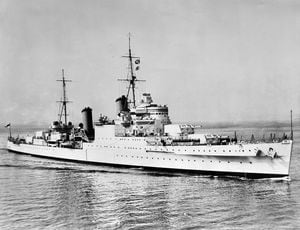
The court martial of Drew is reputed to have been the longest in naval history. And its verdict was damning.
Rather than prematurely scuttle his own ship, it was his duty to do his utmost to get her to harbour, it ruled. Captain Drew was severely reprimanded, and his card was marked to ensure he never had a sea command again.
Some key factors had counted against him. HMS Manchester was not sinking. Sterling work by his crew had seen the list largely righted and, although seriously damaged, given time HMS Manchester would have been capable of steaming, albeit at greatly reduced speed, being transformed from a sitting duck to an extremely vulnerable limping duck which could have taken its chances in attempting to reach a port.
A little over a year earlier the ship had suffered an almost identical torpedo hit but, with Captain Drew in command, was able to reach Gibraltar.
The tactical circumstances of that incident were far more favourable, with the ship on the open sea, in contrast to 1942 when HMS Manchester was only two miles off a hostile coast in seas and skies infested with enemy U-boats, torpedo boats, and aircraft, and with prospects of success in hobbling to a distant port looking slim.
No wonder then that many of the crew – the ship had a complement of over 800 men – felt they owed their lives to Captain Drew and that he had been treated abominably.
The controversy was reignited when the wreck was discovered off the Tunisian coast in 2002. Divers found the ship was severely damaged and the expedition leader asserted that Manchester could never have reached port.
Ben Haywood of Smethwick, who in his 20s had been a gunner on board, launched a campaign to get the Admiralty to reopen the case.
"We had been under continuous bombardment for three solid days and our ammunition was running out. We would not have been able to defend ourselves if we had been attacked and the ship was not manoeuvrable. We would just have been blown out of the water," he said.
"It was a brave decision he made. If he had gone by the book I would not have lived to reach 80-odd years old, had five children, 13 grandchildren and 14 great grandchildren."
The ship had secret radar which would had fallen into enemy hands had the ship been captured.
"There was nothing else he possibly could have done."
The Reverend Peter Crockett, Captain Drew's grandson and at that time vicar of St Luke's Church in Exeter, said: "He was very hurt by the way he was treated. I don't think he ever recovered."
Captain Drew's daughter Daphne Freeman said her father rarely spoke of the affair and was of a generation which did not complain.
"He did speak to the First Lord of the Admiralty, A V Alexander, who concluded that nothing could be done. And my father accepted it, provided he was not considered a coward. A tougher man would have demanded an inquiry."
The late Ben Haywood's campaign to clear his Captain's name failed, as in 2004 he was told that the case would not be reopened.
For decades the court martial records were not in the public domain, but on their release they have been included in a 2015 book dedicated to the affair by naval historian Richard Osborne, titled The Watery Grave.
HMS Manchester, a relatively new cruiser armed with 12 six-inch calibre guns, had been hit by a single torpedo fired by an Italian motor torpedo boat lurking in the dark at about 1.10am on August 13, 1942, about two miles east of Kelibia Light, Tunisia. The hit was on the starboard side by the aft engine room. Three out of four engines were put out of action.
There was no panic, and Drew himself exuded calm.
Scores of crew members were taken off by a British destroyer which came alongside, and after the order was given to abandon ship and scuttle her, the rest, including Drew, made their way to the shore where they were held prisoner by the Vichy French, being released after months of tough captivity and returning to Britain.
About 10 crewmen died in the torpedo strike, another drowned while attempting to reach shore, and another is said to have been encouraged to escape with the connivance of bribed French guards, and then shot in the back and killed by those same guards while climbing the wire.
It is said that it was only Drew's coolness and wise leadership which averted a full scale prison camp riot.
HMS Manchester had been taking part in Operation Pedestal, a desperate attempt to shepherd a convoy of fast merchant ships to besieged Malta, the Allies' only toehold in the central Mediterranean. Only five of the 14 merchant ships which set out made it, and the Royal Navy protectors suffered heavy losses too.
At constant alert and repeatedly attacked, HMS Manchester's crew got little sleep and the strain on all involved must have been immense.
Although the general opinion seems to have been that Drew had put his crew before his ship, Osborne's book reveals that at his court martial Drew justified his actions on tactical considerations, and to prevent the danger of the ship falling into the hands of the enemy.
Born in Oswestry in 1895, he was from one of the town's best-known families. Educated at Oswestry School, he chose a naval career and at Dartmouth Naval College became a great friend of Lord Louis Mountbatten during their cadet days.
He was awarded a Distinguished Service Cross in 1917 for operations in coastal torpedo boats off the French coast.
He married Miss Isabel Nicholson at St Oswald's Church in Oswestry in June 1921. The Drew family home at the time was Plas Wilmot – once the home of famous war poet Wilfred Owen – and the Nicholsons' was at Park Issa.
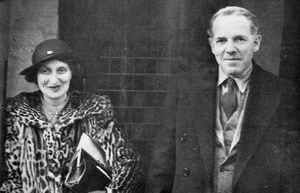
Isabel's father owned Whitehaven Quarry near Porthywaen and the family had previously lived at Bridge House, Llynclys, giving an enduring connection with nearby Morton Church.
Harold, who was known as Peter after his marriage as his wife preferred it, was the son of Charles Drew who established Drew's Mineral Water Company in King Street, Oswestry, and at some stage owned the Wynnstay Hotel.
The couple worshipped at Morton Church, where churchwarden Lizzie Lawrence still remembers the Captain and is familiar with the story – she is herself ex-military, having been the last Regimental Sergeant Major in the Women's Royal Army Corps before it was disbanded.
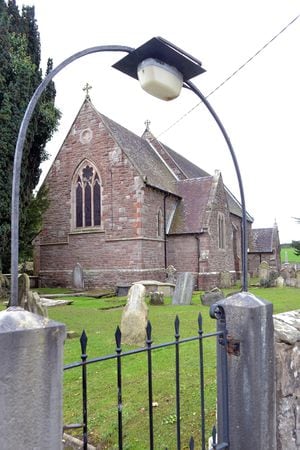
"He was a very old man when I met him," she said.
The standard of the HMS Manchester Association, an old comrades association, was formally laid up in the church on May 17, 2009, in a service in which Drew's grandson the Rev Peter Crockett assisted, and in which the colour party was provided from HMS Biter, the Royal Naval unit at Manchester and Salford universities.
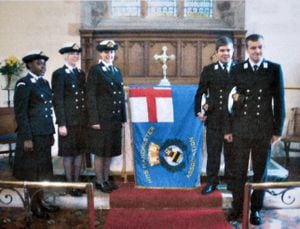
There is too a plaque within Morton Church in memory of Captain Drew, which was dedicated on November 10, 1990.
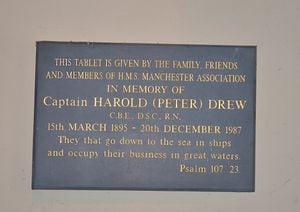
He had died aged 92 on December 20, 1987, at the home in Scotland of his daughter Daphne, with whom he had lived for about five years before his death.
Isabel died on July 2, 1998, aged 105. They were cremated and their ashes are together in the churchyard at Morton Church.
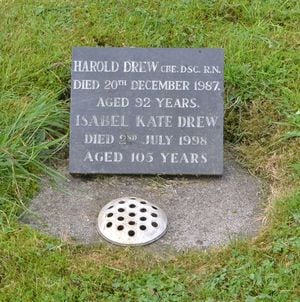
Lizzie says Daphne died either in January this year or last, and it was her wish that her ashes would be brought from Scotland to join her parents at Morton, although this has not happened yet.
Drew ultimately reached the rank of Commodore and the enduring hurt the family must have felt about the HMS Manchester episode is tellingly revealed by his obituary published in the Border Counties Advertizer, which makes no mention of the ship whatsoever.
In 1943 he went to a staff appointment in Bombay, it says, and in 1946 he was chairman of the committee which organised the victory celebrations, and was appointed a Commander of the British Empire.
He became aide-de-camp to King George VI in 1948 and in the same year went out to India where for three years as Deputy Commander in Chief he played a major role in shaping the organisation of the Indian Navy following the turmoil of partition.
He retired from the navy in 1952 and then lived for many years at Dunvegen in Morda Road, Oswestry.
For 15 years he was president of the Oswestry branch of the Royal Naval Association.
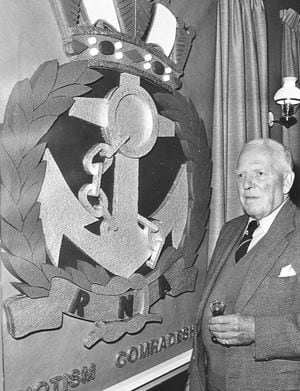
The Manchester incident was not considered the finest hour of the Royal Navy, although perhaps today public opinion would be supportive of a Captain who took action which saved his crew ahead of his ship.
However, in The Watery Grave, Osborne sides with the prosecution, and reaches the speculative conclusion – as there is no evidence – that Captain Drew cracked up.
"It is likely that he had become a casualty of overstrain bordering on mental breakdown well before events of the night of August 13," he writes.
"Put simply, by August 1942 Captain Drew had become the wrong man in the wrong job at the wrong time and his superiors must take some of the blame for leaving him in post for which he had become unfit."
